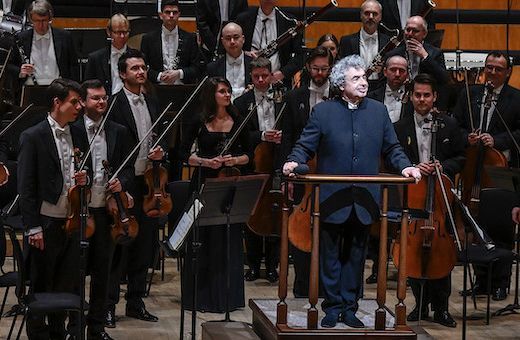The Czech Philharmonic under Chief Conductor Semyon Bychkov are back in town. Which piece would you most want to hear them play? A Dvořák symphony would be a good choice (he conducted their immediate predecessors), maybe the Seventh, usually regarded as the greatest? But that estimation privileges the Austro-German symphonic tradition, the Seventh often approved as being the “most Brahmsian”. The Ninth owes as much to the New World as to Europe, but the Eighth is an essentially Bohemian symphony. Its folk-like themes are treated in a very individual way... about which Brahms complained.

The Czech cellos opened the Allegro con brio with pensive melancholy, followed by that unlikely symphonic motif, a piping call on the flute, which might have been indulged a bit more than it was here. When the splendid trumpets blazed out with that first cello tune above a later orchestral tumult, they were announcing a glorious night for the brass section. The Adagio would have benefited from more relaxation for its many lyrical woodwind moments, though the playing was fine, but the Allegretto grazioso saw Bychkov ease into its dance measure more beguilingly.
The finale begins with a trumpet fanfare. A previous great conductor of this orchestra, Rafael Kubelík, said “In Bohemia the trumpets never call to battle – they always call to the dance”. No-one told these trumpets, who rang out with martial éclat, as they did again in the reprise near the end. In between the variations were robustly done, and their sequence had that symphonic logic that this impressive interpretation had prioritised – one that was, perhaps, in the end rather Brahmsian.
Before the start of the performance, Bychkov made a short speech, and the orchestra played Ukraine’s national anthem. Janáček, whose Glagolitic Mass filled the second half, said of it “I wanted to express faith in the permanence of the nation”. Janáček was no believer (“until I see for myself”), but did support the Pan-Slavic movement, which emphasised the shared identity of Slav people. There could be no more appropriate choice than the Glagolitic Mass, with its text of Old Church Slavonic, for a concert which Bychkov had dedicated to the people of Ukraine.
What a sound launched this Mass! Like Janáček’s Sinfonietta it opens with a fanfare, and how it was blazoned forth by the Czech trumpets and horns, the steely strings following with their urgent rhythm. In the Gospodi pomiluj (Kyrie) Evelina Dobračeva soared above the choral sound with piercing cutting edge, steady tone and accuracy. Similarly tenor Aleš Briscein, whose part can sound strenuous, was ideal in the Slava (Gloria), with ringing headnotes and passionate phrasing. Bass Boris Prýgl and mezzo-soprano Lucie Hilscherová have less to do in this work, but showed much the same qualities. All four caught this work’s extraordinary fervour.
The City of Birmingham Symphony Chorus, whose Glagolitic might have become rusty since they recorded this piece with Simon Rattle forty years ago, were excellent. Choirmaster Simon Halsey had prepared them well, and they sounded at home with text and notes. Their Veruju (Credo) and much else was sung with quietly ecstatic awe, though whenever Janáček increased the volume the choral thunder was heaven-storming. The mighty organ solo was in the capable hands (and initially feet) of Daniela Valtová Kosinová. This account from Bychkov was urgent and imploring, a universal pantheistic masterpiece. As he said of the programme at the start, “both these works celebrate life”. Don’t miss the BBC broadcast when it comes around.


